Kappa's Commentaries #1: British Crimesolvers Edition
I'm having a really hard time writing lately, as much as I want to. It's intimidating, trying to get back into it after having taken such a long break. I'm also exhausted most of the time, especially the language part of my brain--there are a fair number of evenings each week when I come home and don't want to even talk on the phone, because I feel like I've used up my quota of being able to string words together coherently for the day.
Anyway, I am trying to ease myself back into the habit by writing little reviews of/reactions to things I've watched or read in the past...well, most are in the past months, some are in the past couple of years, looking at my idea list.
Without further ado, I give you spoilery reviews of:
Sherlock Series 3
The primary mysteries weren’t as clever as previous seasons, but the character work and humor made Season 3 quite possibly my favorite. I like that the creators were willing to shake things up a little bit by going well outside the “Sherlock and John in 221B waiting for a case” formula. I like that they were willing to not take themselves too seriously, too. It seems like there are complaints that the resolution (or non-resolution) to last year’s cliffhanger (or maybe we should call it a “ledge-hanger”?) was too ambiguous and self-aware, but let’s face it: they were never going to come up with a solution that the Internet hadn’t come up with in the two years between episodes. They had to do something creative, and Anderson and his Baker Street Irregulars theorizing was a great solution. The pacing of the solution was a little weird, with that long interlude while John and Sherlock are stuck on the underground car that’s about to explode, but I don’t know where else you’d put it.
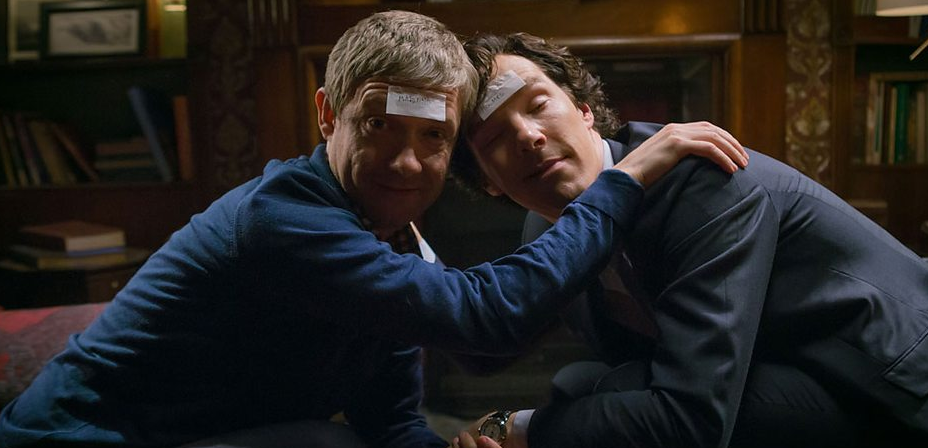
Episode 2, with Sherlock’s epic best man speech, was probably my favorite hour-plus of television this year. The stag party (especially Sherlock’s drunk mental-text-process), Mrs. Hudson’s romantic history, the wedding planning (the napkins-“That just…sort of happened”!), the waltz-it was adorable and hilarious, and clever, and full of delicious character moments for Sherlock, John, and Mary.
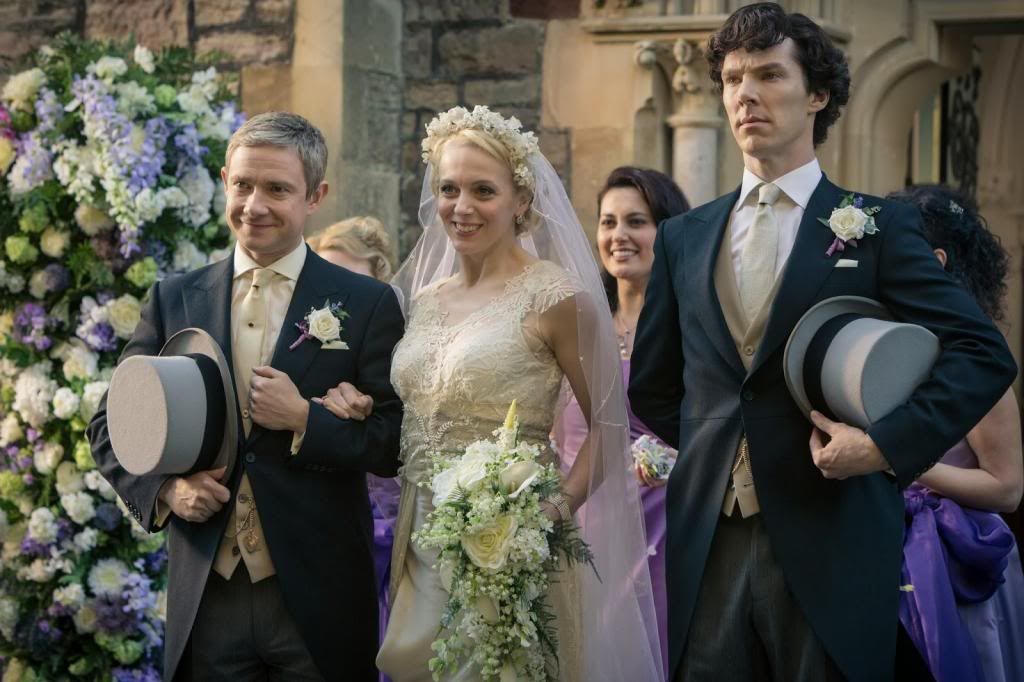
I adore Mary. There were so many ways her addition to the John-and-Sherlock mix could have been disastrous, but the show really did avoid the main clichés (jealousy, nag, Mary Sue, etc.). I had guessed that something was up with Mary’s past when Sherlock read the wedding telegram from “CAM,” but I was way off as to what it was-my guess was Witness Protection. It’s perhaps stretching things a bit that Sherlock didn’t pick up on anything with Mary earlier, or if he did, he wrote it off (the words buzzing around her head when they first met included “liar,” after all). But I can excuse that by chalking it up to Sherlock being so grateful that Mary is on his side in mending things with John and the rest of Sherlock’s life is so topsy-turvy that he decided that information was irrelevant, as everyone is a liar.
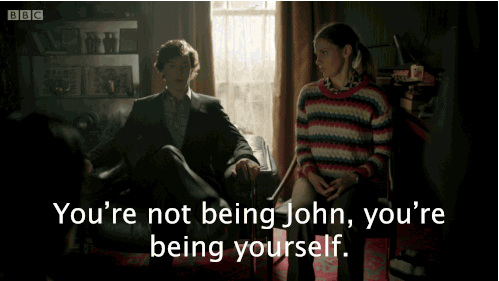
No review of a Sherlock season would be complete without a shout-out to my girl Molly, who was in fine form. I’m so glad Sherlock acknowledged her contributions, and valued her as her. I’m also so glad Molly was strong enough to not only see that being a John-substitute was not good for her, but also had the strength to bow out of that role with so much calm and grace. So she’s dating a Sherlock look-alike-can’t diss the woman for having a type. ;)
Luther Series 1 & 2
Wow, who knew a cop show could be so fantastic? Of course, this is because Luther is not really a cop show; it’s a show about a cop dealing with what justice is, who should get to define it, and how far an individual can go to see justice done before he actually crosses the line into injustice himself. Idris Elba is fantastic-no surprise-and I love the supporting cast, especially Ruth Wilson and Indira Varma, who were favorites of mine from Jane Eyre and Torchwood, respectively, before this. Also, I find both Ripley and Zoe’s boyfriend very attractive (I think it’s the curls-why yes, I do have a “type.” Why do you ask? ;) ). A smart, engrossing show and eye candy all over the place? What more can you ask for? :)
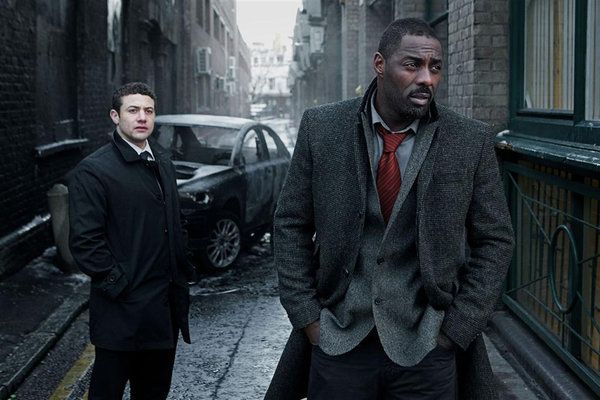
I’ve only seen the first two series. Series 1 was far and away my favorite of the two. The Luther-Alice dynamic was the most fascinating part of the show, and I acutely felt her absence in the latter part of Series 2. I know Alice was a narcissist, but Luther struck me as a narcissist in a lot of ways, too, just one that turned his brilliance in a different direction than Alice did. Alice’s narcissism led her to believe she knew who should live and die, and that her beef against her parents entitled her to kill them. Luther flirted with that kind of narcissism at the very beginning with the child murderer who fell to his death, and at the end with the cop who killed Zoe, but there was another kind of narcissism, too. Yes, Luther is brilliant, but he always seemed to believe he was the only one who could solve the case and save the next victim. That meant he had to be on the case. It seemed that Luther felt removing him from a case was aiding the criminal and making the department complicit in the crimes.
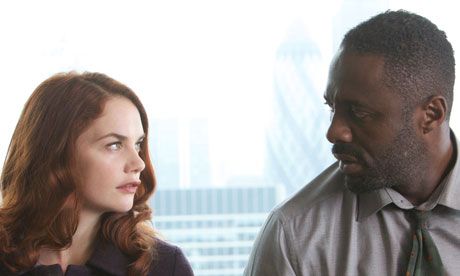
I feel like there were some beats I must have missed in Series 2. First, why could Pam Ferris exert so much power over Luther, when it was clear what she was doing was illegal (talking about the girl as property, the girl saying they’d break her ankles for running away, nailing Luther’s hand to the table, etc.), and Luther has nailed people on much less. Is it that he jumped in too fast, and didn’t have time to fix things in a smarter way than scaring the other human trafficker into not ratting out the son?
And did the girl’s mother intentionally set Luther up to be Pam Ferris’s bitch as revenge for Luther putting away her husband and leading to suicide, or am I reading too much into that? Because she didn’t seem at all interested in having her daughter back once she actually had her.
I did like the introduction of Erin Gray and the contrast between her and Ripley. There needed to be a voice towing the line and questioning whether the ends really do justify the means. Ripley was too close to Luther to possibly do that anymore. It’s too bad Erin didn’t go about questioning this ends/means issue in a smarter way, but I did feel bad for her when it came back to bite her. I’m really glad that Ripley acknowledged that he was responsible for her downfall and wanted to make it up to her somehow, and I’m curious to see if he ever does.
Anyway, I am trying to ease myself back into the habit by writing little reviews of/reactions to things I've watched or read in the past...well, most are in the past months, some are in the past couple of years, looking at my idea list.
Without further ado, I give you spoilery reviews of:
Sherlock Series 3
The primary mysteries weren’t as clever as previous seasons, but the character work and humor made Season 3 quite possibly my favorite. I like that the creators were willing to shake things up a little bit by going well outside the “Sherlock and John in 221B waiting for a case” formula. I like that they were willing to not take themselves too seriously, too. It seems like there are complaints that the resolution (or non-resolution) to last year’s cliffhanger (or maybe we should call it a “ledge-hanger”?) was too ambiguous and self-aware, but let’s face it: they were never going to come up with a solution that the Internet hadn’t come up with in the two years between episodes. They had to do something creative, and Anderson and his Baker Street Irregulars theorizing was a great solution. The pacing of the solution was a little weird, with that long interlude while John and Sherlock are stuck on the underground car that’s about to explode, but I don’t know where else you’d put it.

Episode 2, with Sherlock’s epic best man speech, was probably my favorite hour-plus of television this year. The stag party (especially Sherlock’s drunk mental-text-process), Mrs. Hudson’s romantic history, the wedding planning (the napkins-“That just…sort of happened”!), the waltz-it was adorable and hilarious, and clever, and full of delicious character moments for Sherlock, John, and Mary.

I adore Mary. There were so many ways her addition to the John-and-Sherlock mix could have been disastrous, but the show really did avoid the main clichés (jealousy, nag, Mary Sue, etc.). I had guessed that something was up with Mary’s past when Sherlock read the wedding telegram from “CAM,” but I was way off as to what it was-my guess was Witness Protection. It’s perhaps stretching things a bit that Sherlock didn’t pick up on anything with Mary earlier, or if he did, he wrote it off (the words buzzing around her head when they first met included “liar,” after all). But I can excuse that by chalking it up to Sherlock being so grateful that Mary is on his side in mending things with John and the rest of Sherlock’s life is so topsy-turvy that he decided that information was irrelevant, as everyone is a liar.

No review of a Sherlock season would be complete without a shout-out to my girl Molly, who was in fine form. I’m so glad Sherlock acknowledged her contributions, and valued her as her. I’m also so glad Molly was strong enough to not only see that being a John-substitute was not good for her, but also had the strength to bow out of that role with so much calm and grace. So she’s dating a Sherlock look-alike-can’t diss the woman for having a type. ;)
Luther Series 1 & 2
Wow, who knew a cop show could be so fantastic? Of course, this is because Luther is not really a cop show; it’s a show about a cop dealing with what justice is, who should get to define it, and how far an individual can go to see justice done before he actually crosses the line into injustice himself. Idris Elba is fantastic-no surprise-and I love the supporting cast, especially Ruth Wilson and Indira Varma, who were favorites of mine from Jane Eyre and Torchwood, respectively, before this. Also, I find both Ripley and Zoe’s boyfriend very attractive (I think it’s the curls-why yes, I do have a “type.” Why do you ask? ;) ). A smart, engrossing show and eye candy all over the place? What more can you ask for? :)

I’ve only seen the first two series. Series 1 was far and away my favorite of the two. The Luther-Alice dynamic was the most fascinating part of the show, and I acutely felt her absence in the latter part of Series 2. I know Alice was a narcissist, but Luther struck me as a narcissist in a lot of ways, too, just one that turned his brilliance in a different direction than Alice did. Alice’s narcissism led her to believe she knew who should live and die, and that her beef against her parents entitled her to kill them. Luther flirted with that kind of narcissism at the very beginning with the child murderer who fell to his death, and at the end with the cop who killed Zoe, but there was another kind of narcissism, too. Yes, Luther is brilliant, but he always seemed to believe he was the only one who could solve the case and save the next victim. That meant he had to be on the case. It seemed that Luther felt removing him from a case was aiding the criminal and making the department complicit in the crimes.

I feel like there were some beats I must have missed in Series 2. First, why could Pam Ferris exert so much power over Luther, when it was clear what she was doing was illegal (talking about the girl as property, the girl saying they’d break her ankles for running away, nailing Luther’s hand to the table, etc.), and Luther has nailed people on much less. Is it that he jumped in too fast, and didn’t have time to fix things in a smarter way than scaring the other human trafficker into not ratting out the son?
And did the girl’s mother intentionally set Luther up to be Pam Ferris’s bitch as revenge for Luther putting away her husband and leading to suicide, or am I reading too much into that? Because she didn’t seem at all interested in having her daughter back once she actually had her.
I did like the introduction of Erin Gray and the contrast between her and Ripley. There needed to be a voice towing the line and questioning whether the ends really do justify the means. Ripley was too close to Luther to possibly do that anymore. It’s too bad Erin didn’t go about questioning this ends/means issue in a smarter way, but I did feel bad for her when it came back to bite her. I’m really glad that Ripley acknowledged that he was responsible for her downfall and wanted to make it up to her somehow, and I’m curious to see if he ever does.